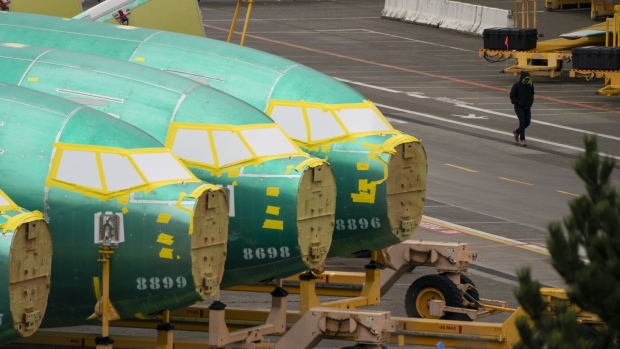Feb 15, 2024
Boeing 737 Max Woes Are Putting Suppliers in a Planning Bind
, Bloomberg News

(Bloomberg) -- Boeing Co.’s challenges with the 737 Max program are putting engine-builder Safran SA in a planning bind.
The French manufacturer expects Boeing’s factory slowdown, an outgrowth of the near-disaster with one of its 737 jets last month, to ripple out to suppliers and have a possible impact on engine deliveries, Chief Executive Officer Olivier Andries said.
To what extent will depend on the US Federal Aviation Administration, which has capped Boeing production until its auditors are satisfied that manufacturing quality has improved. That’s left Safran, which makes the CFM Leap 1B engine through a joint venture with General Electric Co., guessing about how many turbines the US planemaker will need for its 737 Max.
“There will be an impact, potentially, on the production of Leap 1B engines, their deliveries to Boeing, but I can’t quantify that today,” Andries said on a call as the company reported 2023 results.
To date, the US planemaker hasn’t revised its production plans with suppliers, Andries said. “Boeing will probably, before doing anything, wait the end of the FAA’s audit and maybe will make a decision then.”
The mid-air expulsion of a door-size panel off of a 737 Max 9 operated by Alaska Airlines on Jan. 5 has jolted 2024 into a year of uncertainty for Boeing and its suppliers. Until the mishap, the US planemaker was planning to step up production of the Max, its biggest revenue generator and most important product.
Boeing supplier Howmet Aerospace Inc. said this week that it was basing its guidance on a 737 build rate of 34 Max jets per month, below the 38-a-month cadence the planemaker reached at the end of 2023.
Safran for now hasn’t adjusted its planning, Andries said. He affirmed Boeing factories are currently running below the 38-a-month cap imposed by the FAA. The French company said it expects deliveries of Leap engines to rise by about 20-25% this year, including a sister turbine made for the 737’s rival, the top-selling A320 family made by Airbus SE.
Read More: Boeing Sees Gradual 737 Ramp-Up While Tackling Factory Flaws
Still, Boeing’s woes present a risk to Safran and GE. Their CFM International venture can’t easily switch resources to build more Leap 1A engines for the A320, Andries said.
“They are not the same engine,” and suppliers for many of the components are different, Andries said. “There are very few parts in common. Obviously it’s the same technology, it’s the same engine architecture, but it’s not the same engine.”
Airbus said Thursday that it plans to continue ramping up its own commercial jet production, which could offer CFM an opportunity to shift more output to the European planemaker in 2025 should its share of the market continue to grow, Andries said. Doing so this year is impossible, he said.
Once the FAA lifts its cap on Boeing, “at that point, then we will have to review — if ever it will be needed — our plan for production and delivery of Leap 1B engines,” Andries said.
©2024 Bloomberg L.P.


